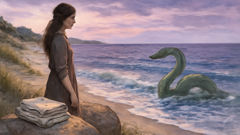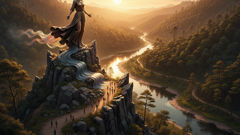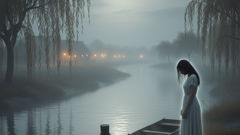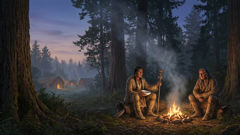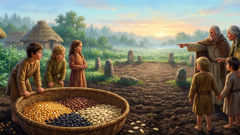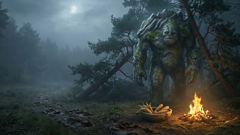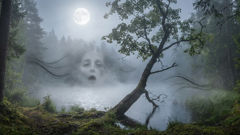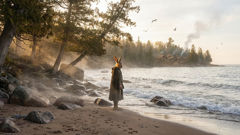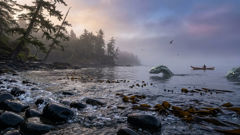Introduction
The Baltic wind keeps its oldest promises. It crosses the dunes with the smell of salt and lichen, combs the grass with a thousand fingers, then loses itself among pines that lean toward the sea as if listening for someone who never arrives. In that country of shifting sands and quiet lakes, where amber washes ashore after storms like trapped sunlight freed by the waves, lived three sisters and their brothers in a wooden house greening with moss. The youngest sister was Eglė. The others teased her for listening too closely to the earth, for hearing stories in driftwood and the lull of evening reeds. On a summer day that felt like a held breath, Eglė and her sisters went to bathe in the sea. They left their linen shifts folded on a stone still warm from sun. When they returned, one shift was gone; in its place lay a coiled serpent, scales glistening like wet basil leaves. It lifted its head and spoke—not with a hiss but with the clean edge of a bell: the garment would be returned only if Eglė agreed to marry its king. The sisters laughed at nonsense and tried to shoo it, yet the serpent would not move, and the sea behind it kept whispering one word, then another, until Eglė swallowed her fear and answered. She bargained for time, for days to tell her family, to braid her hair one last time in the mirror of dawn. The serpent slid into the waves, and at each evening sunset a ribbon of foam curled at Eglė’s feet like a promise. The brothers sharpened scythes and said all kings who came from water were thieves; the mother crossed herself and tied red thread around the doorframe. But the ninth sunset comes for everyone. When it came for Eglė, the wind ceased playing and simply listened.
The Shore and the Shirt of Scales
Eglė’s brothers had the stubbornness of men who plow through stone and call it soil. The serpent’s terms were insult and folly to them. They tried to trick whatever listened from beyond the horizon by hiding Eglė beneath a bench as the ninth sunset bled into rose and brass. They sent out the eldest sister in Eglė’s borrowed shawl. But the foam that curled at the edge of the tide slid back with a shiver, as if tasteful about impostors. The middle sister went next, her voice jagged with fear, and the sea turned a flat, disinterested gray. Last of all their mother carried a loaf still hot and fragrant and begged the waves to accept bread instead of a bride. She cast it where the water licked the sand, and the loaf spun end over end like a summer swallow and sank without a ripple. From beneath, a single bubble rose and touched the bread crumbs clinging to her palms. The family told themselves it was only the tide breathing. Yet when they returned home, the red thread on the lintel had been cut by something that did not need a knife, and the mirror in Eglė’s room held the tired reflection of a shoreline none of them had seen.
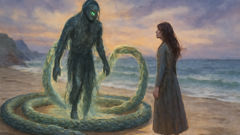
The serpent returned with the patience of a winter moon, never pushing, merely appearing where Eglė’s footsteps ended. It coiled on her windowsill and at the edge of the well that held sky instead of water, and once on the threshold like a dropped necklace. It did not bite. It did not blink. It waited while Eglė walked the rooms of her life: touching the ladder worn smooth by a century of hands, tasting the light beer poured around for courage, collecting small things that meant nothing to anyone else and everything to her—a stone shaped like a tear, a hair ribbon faded to the color of old nettles, a dry sprig of heather that still smelled of sun. On the ninth evening, Eglė rose before anyone could stop her. She dressed in her blue skirt with its embroidered hem and the white blouse her grandmother stitched, the one that always remembered the warmth of summer culled from winter. She stepped into the yard. The serpent lifted its head and, for the first time, inclined it as a man bows when a procession passes, neither humble nor proud but seeing clearly what is owed.
The village trailed Eglė to the beach not because they understood but because curiosity clings to fear the way burrs cling to wool. Old women carried little knives wrapped in cloth, talismans sharp enough to cut a curse, and young men stood with shoulders thrown back, sharpening their plans on one another. The sky drew the remaining light inward, as if it thought to keep a little for itself after all these years of spilling. Eglė walked alone across the sand combed by wind and decided she would not be dragged to any fate. If a king called from water, then either it would be a king or it would be nothing. The serpent slid into the breakers; the sea breathed in and returned, and with it came forms gleaming like hammered copper: not one serpent but hundreds, their scales catching the dusk in shards of emerald and onyx. They circled Eglė in a ring that did not touch her. From the center rose another, larger snake whose scales were black-green, a color you find only in rivers at night or a cormorant’s wing. It curled upon the sand and, as it lifted its head, its shape loosened, unraveling like a plait untied. Where scales were, skin appeared; where cold had been, warmth; where the long glittering body had moved, there stood a man with sea-salt in his hair and eyes the color of wet alder leaves.
“I am Žilvinas,” he said, and when he spoke the name, the ring of serpents let it travel through them like a sound taught by a shell. No lanterns were lit. The light poured out of the west as if the sun were turned, not setting, and the water carried it to their faces.
Eglė lifted her chin and did not reach for his hand, though he held it out to her. Something in his stillness reminded her of the untroubled mornings when the lake lay flat as polished horn, and of the first snow that edits the world down to what matters. “Give me your word,” she said, “that what follows will not strip me of mine.”
He nodded without speaking. The ring of serpents opened, the sea drew back as if to clear a path, and Eglė followed the man whose name moved like a reed in wind. The villagers did not try to hold her. They had expected a fight, and the absence of struggle left them with their hands full of nothing. Eglė turned once to see her family on the ridge of the dunes, silhouettes against that stock of light the sky could not spend. Her mother’s scarf lifted and fell with the breath of the sea; her brothers’ shoulders were shields they could no longer put down. Eglė slid into the water up to the knees, and it surprised her: not cold, not warm, but like the air inside a church that has kept the breath of a hundred years. Žilvinas took her hand then, his palm callused, and with a downward rustle of scales against the deep the serpents plunged. She did not drown. She learned that falling through water is another way of being carried.
Beneath the surface was not darkness but a softened world. She thought at first the sand moved of its own accord, but it was a school of silver fish shearing through the current like falling needles. The serpents parted; their bodies composed a corridor; and the path broadened into an antechamber the size of the world. A roof of wavering light hung overhead. Beyond, she saw pillars of green glass, the shadows of oaks that had learned to breathe water, and halls crowded with earrings of pearl still sleeping in shells. She passed people who were not people, courtiers who were not quite serpents, and an arch made of a ship’s broken spine riddled with star-holes where meteor iron once slept. Žilvinas walked her to a throne that wasn’t a throne, more like a place where the sea went to sit when it remembered. He bowed as if to a queen and asked if she would be one. She thought of her village and the hundred small things that had composed the shape of her life. Then she thought of the ninth sunset and how the sea waited without hurrying her, and she said yes in the way snow says yes to a branch that bends without breaking.
The Palace of Green Glass
News travels differently underwater. It isn’t carried by feet or hooves but by currents that remember the moon. Eglė learned to read the water’s handwriting—how a tide pressed at the door meant a storm, how a tremor in the kelp foretold their court musicians would arrive late, how the glass domes darkened when seals passed overhead and brightened when there was a rumor of whales. Žilvinas’s halls were bound with coral ribs and hung with veils of algae soft as horsehair. Light poured down in braided strands through garden windows open to the sea, and every surface seemed gently alive, humming with the quiet business of plankton and barnacles and the ideas of water itself. The king’s crown was not hammered metal but a circlet of shells arranged in a spiral that made the eye think of galaxies. He wore it only when ambassadors arrived: carp that had learned to write letters of apology with their tails, river spirits with eel-bright smiles, once a woman from a lagoon who rode a heron down as if it were a white horse felled by silence. Eglė stood beside him with her hands resting at her sides. She learned to become fluent in listening, which is the first language and the last.
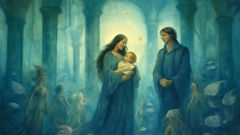
They married without the long speeches of the hill villages or the heavy tablets of the lowland towns. The sea is all witness and does not need to be told how to keep a secret. A silver net was cast over them and drawn back; the threads left light on Eglė’s skin like fingerprints. Gifts came: a comb carved from a single piece of horn that never snagged but remembered each strand; earrings of amber that carried small worlds inside them—dried flies caught forever mid-thought; a shawl woven from sea-silk, that rare filament the moon hides in its sleeve. Žilvinas gave her a flute carved from driftwood that had traveled so far it considered itself native to every shore. He told her to keep it close, not for protection but for remembrance. “Home’s a shape you finish drawing somewhere else,” he said, looking like a man listening to rain. She played it in the evenings when the water darkened, and doors inside the palace stayed half open, and a fish with eyes like coins watched as if music were a food.
Seasons underwater do not announce themselves with snowmelt or leaf-fire, but even there the world turns. Once, after a storm, the walls flickered for an hour as if wrapped in lightning; once, in the depth of a warm spell, plankton threw a festival that made corridors glow as if someone had stirred stars into them. The year Eglė’s first son was born, a whale passed above the palace and sang a lullaby that made even the stone breathe slower. They named him Ąžuolas, Oak, for the grove her father had planted that leaned toward the sun as a congregation leans toward the priest. The second son came the next summer and was named Uosis, Ash, for a tree that had snapped in a storm and sprouted three trunks from its wound. The third, Beržas, Birch, was the color of dawn milk and had a soft determination that made everyone follow him without knowing why. The last child was a daughter, Drebulė, Aspen, who was light-footed and quick-eyed and trembled when happy. Eglė held them and spoke to them in the language of the shore: the names of birds, the shapes of clouds, the boots one wears to lift hay from meadow to barn, the trick to stop bread from cracking in winter. The sea listened as if learning a second tongue.
Yet memory keeps its own tide. After seven harvests counted by absent fields, the ache to see her family rose in Eglė like a moon so full it nearly spills white onto water. She asked Žilvinas to let her go to the world above, only for a visit. He walked the circumference of the glass garden three times, counting steps in a way that meant he could not count what mattered. He loved her, not with the hunger that eats what it can have but with the kind that feeds what it cannot hold. Still, he was the keeper of a thousand lives that depended on the tides he understood. “You may go,” he said at last, his voice like a tide turned obedient. “But promises are salt, and I know their taste.” He taught her a call to draw him from the deeps, a short sequence of words that folded together like the pods of a milkweed plant. Say them on the seventh wave, he told her, with your flute tucked at your belt. Say them only with your own mouth. Then he placed a necklace of small shells around her throat, and when she clasped it she felt the cup of each shell hold a thimble of cold.
They traveled up through blue upon blue, the serpents escorting their queen and the royal children. The court parted, the roof of water lifted, and the world arrived—spindrift and sun sat upon it like a king on ordinary wood. The air was so light it felt unfaithful. Birds wrote hurried messages in the sky and tore them up with their wings. Eglė stood on the beach that had waited without waiting and held her children’s hands and told them, “This is where stories grow their roots.” She took them to the village along the dune spine, and the smell of rye bread being cut brought a sudden sting behind her eyes. Her mother wept with joy a long time before grief had a chance to remember itself. Neighbors poured into the yard and ate bread standing, and everyone talked at once, all words jostling like goats at a gate.
But the brothers sat apart at the edge of the yard, scythes propped with casual villainy against the wall. They watched the serpentine necklace and thought it too tight. They heard the children’s laughter and thought it too loud. They set down their cups and asked questions that pretended to be concerned: Was she comfortable underwater? Did the king give her time to sleep? Did her children eat fish, and was that not a sorrow? One brother asked what the call was, that small folded rope of sound that drew the king from water. Eglė smiled and said that some doors cannot be opened unless they recognize the hand, and her mouth would not betray the lock. The brothers nodded, as men do when they hear no and mean to turn it into yes with enough tools.
Time is a bag with holes. The seven days Eglė had been given grew light and fell through while no one was looking. On the last afternoon she gathered her children by the old well, whose water still remembered her face, and told them gently that partings make a place for meetings to sit down. They must go to the beach and call for their father. She showed them her flute, pressed into oak-darkness by her palm, and told them the shape of the words she had been given: simple as milk, carrying her name like a lantern silently swung. “If anyone else asks for this,” she said, “close your hands and pretend you are the sea clenching its fist around a pebble.” The boys looked at her with the sturdy loyalty of trees learning wind. Drebulė’s mouth trembled, aspen-like, but she nodded, eyes bright as drops lifted from a bucket.
That evening the brothers sent for the children quietly, the way a hunter draws water in a forest where the deer listen. They offered sweets the sea did not know how to bake and asked about kites and trumpets and whether fish learned their music or were born to it. Then their voices walked down into the coolness of an unused cellar and grew colder. “Tell us the words,” they said. “Your mother is not safe. What king leaves his wife to climb stair after stair for air like a commoner? We will test him. If the call is strong, he will come strong. If the call is weak, he will come weak. We will return your mother to a life not borrowed from waves.” The boys clenched their hands the way their mother had shown them. They swallowed their fear until it grew into a stone, and they kept it. The brothers’ voices hardened as old knots. Threats piled upon threats, blunt as farm tools and just as heavy. Beržas, smallest, cried without making a sound and still kept his mouth shut. It was Drebulė who broke—with love, not disloyalty; with fear more for her mother than for herself. She gave up the call in a whisper that carried its own disgrace, the way some flowers close at night and will not say why.
Afterward, the brothers brought the children to the edge of the yard and told them to play. They called the day good. They drank. They laughed with teeth. And the moon rose from the far field and, seeing all this, wished for the first time it was only a cloud.
Foam and the Forest
Morning arrived with the kind of brightness that looks like a promise and often is a warning. The brothers reached the beach before anyone else, their boots heavy with damp. They waited until the seventh wave built itself, a cathedral about to topple into prayer, and shouted the words Drebulė had surrendered. The air lifted like a bird taking a breath. The sea uncurled, and up came Žilvinas—not as man, not as serpent, but as what love looks like to water. He rose without suspicion because grief hasn’t yet taught him to be careful. He saw his wife’s shape nowhere on the shore, only her brothers’ silhouettes cut from the same cloth as clouds before hail. He looked once, quickly, toward the village ridge, and in that blink the brothers fell on him with iron they had carried like a dark thought that grows fat on bread. They used hooks that had pulled ships from shallows, scythes that had read the language of wheat, and poles whose ends were weighted with fear. The sea stumbled forward as if to help, but men had chosen. Choice makes a fence even water does not cross.
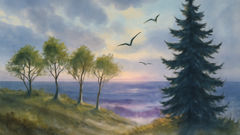
What the waves returned was not a body but a silence that wrapped the brothers to the bone. Foam spread across the sand like too much lace on a poor bride’s dress. White turned pink. Pink turned the color of a faded pomegranate’s bruise. The brothers stood stripping breath with their mouths and told themselves they had restored order and air and justice to a situation that had never asked them to judge it. They walked back up the dunes carrying nothing and, by the time they reached the first rye field, could almost have believed nothing had happened if the gulls hadn’t circled them like questions.
Eglė and her children came later. She had braided her hair in the way she wore it the first day she swam beneath the world. The flute was at her belt. Her sons ran ahead, races stitched from laughter, and Drebulė followed, careful for sharp shells. Eglė stepped onto the tide line and felt immediately what the sand kept telling anyone who would listen: that the sea had been interrupted mid-sentence. She lifted the flute and played the call as she had been taught, not loudly but exactly, placing each note where the water expected to find it. The seventh wave lifted, and the shore felt it like a heart hearing its own name. Nothing came. The water took a small step backward, then forward again. Eglė called a second time, added the quiet syllable between the words that only love hears, then placed the pause in its cradle. Nothing came. Foam touched her toes and retreated as if sorry. A gull ripped the sky in half with its cry and stitched it back together with a smaller stitch as if ashamed of the mess.
“Mother?” Beržas whispered, as if someone had fallen asleep nearby. Eglė knelt and kissed each child once, quick as a priest with a handful of blessings. She walked to the place where the foam had stained the sand with the color that could not decide between flower and wound. She touched the damp and lifted her fingers and smelled them. It was like touching a lock of hair after the barber has left and finding it still warm. Her mouth opened and shut. The children thought for a moment she had forgotten how to speak. When she found language again, it wore a new face. It had walked away from the house where mercy lived and into one where it did not.
“Listen,” she told them, though their small bodies had already become ears. “We are made of promises. When a promise is broken, even the trees hear it. Do you hear them? The oaks are holding their breath. The birches are rubbing one white wrist across another white wrist like women washing clothes at dusk. The ash is counting. The aspen is trembling because it cannot keep still when news arrives.”
The children said they heard. And Eglė, who had never before in her life raised her hand to a living thing, closed her eyes and opened the door inside her that had a lock she had never tried. She spoke not to her children but to the world across the skin of their names. When she looked at Ąžuolas, the boy who would stand straight even in gale, she saw a trunk rising patiently as bread. “Be oak,” she said, voice flat as iron. “Keep the thunder safe.” He stiffened, then softened, then lengthened as if listening to a story told over centuries. Bark slipped over his skin like a coat that had been waiting all his life to come out of the wardrobe. He did not cry out. He simply understood, the way a strong child understands that love wears many uniforms.
She turned to Uosis, whose loyalty bent without breaking. “Be ash,” she told him. “Hold the riverbanks in spring and the tool handles in winter. Keep the world good for work.” The boy closed his eyes and lifted his hands and, when he opened them again, they were branches that knew how to host nests and catch snow and carry the weight of a tire swing future children would tie there when no one remembered his first name. For Beržas, whose laughter had always been a pale brightness in the house and who had cracked into tears without a sound that morning, she said, “Be birch. Be the white of forgiveness that comes in late winter and thinks itself early spring.” He became slender and many, a grove of a boy who healed with company.
Drebulė stood shivering with love and with fear. Her mouth opened and then closed around tears she could not return to their river. “Mother,” she said, that single word the little basket into which children put the entire market. Eglė touched her cheek, the soft down of an aspen leaf underneath her palm. “You have a beautiful heart that loves quickly,” she told her. “May it learn to love stubbornly, too.” She raised her hand not in anger but in the torn authority of someone who has been emptied and must now fill what can be filled. “Be aspen,” she said, and Drebulė trembled as if happy. She became the first to move when wind arrives and the last to grow still. When the world wants to know whether weather is coming, it listens to the aspens.
Last of all, Eglė looked toward the water and then down at the place where the sand scabbed slowly. She felt inside herself the old quiet of the underwater halls, the green light braided by current, the private laughter she and Žilvinas had tended like embers in a hearth the size of a sea. It was not only a husband she had lost but an entire grammar by which to speak to the world. Grief is not a season; it is a climate; and sometimes it replaces weather forever. She stood taller than the dunes and smaller than the wind and spoke her final shape. “Be spruce,” she told herself, and the word stepped into her the way a stranger steps into a room and discovers it was his all along.
She planted herself at the edge of the forest where land remembers it was once water and water remembers it was once sky. Needles combed the air for news and found none that comforted. She kept her green when the birches peeled their paper stories, when the oaks dropped their bronze, when the ash stacked shadow upon shadow on snow, when the aspens shivered like a congregation after a scandal. Hunters learned to measure the year by when her darkest green grew almost black against the slate of January. Lovers carved their names on the birch that had once been a boy who laughed; children learned to climb the ash that had once been a boy who did what was needed without shouting; elders sat with their backs against the oak that had once been a boy who could not be hurried. Travelers stopped at the edge of the spruce and listened because the wind played it like an instrument that only performs laments. When storms threw tantrums and great waves came to knead the shore, the spruce stood and did not move, and some said this was strength and some said it was suffering and most learned a little of both.
There are those who claim that in the late blue of a certain evening, when the moon has decided to stay but not to shine, the dunes lift a fraction of an inch and you can see a corridor open under the sea—the one where pillars of green glass hold up a roof of water. They say a shape passes there, serpent-long and man-shaped, and turns its head toward land. Perhaps it comes to hear the ash count the number of times a promise has been kept that day, or to see the oak keep the thunder safe, or to read the birch scrolls peeling their lovely white skin and feel he has not wasted his years. Perhaps it stops to watch the aspen chatter her green coins and admire the courage it takes to tremble without running. And perhaps he stops longest at the spruce on the ridge, the one that does not put on a bright dress for summer or a red shawl for fall but holds the same solemn hue all year—because there are loves that do not want to be healed. People tell the story and disagree about the ending, because endings are mirrors and do not always show the same face. But whenever the wind comes from the northwest and smells of salt and something like memory, the spruce leans a little, and if you stand very still you might hear a flute being played under your own ribs.
Conclusion
Lithuania’s coast keeps the legend the way dunes keep the footfalls of yesterday’s wanderers—shifting, softened, but there. Eglė’s story threads love through loyalty, and loyalty through loss, until each strand is indistinguishable from the next. A serpent king named Žilvinas isn’t a monster here but a mirror, reflecting our own hunger for a love that listens. The brothers’ iron isn’t only iron; it’s the certainty that crushes what it does not understand. The children’s new shapes aren’t merely trees; they’re grammar for remembering. If the oak stands for steadfastness, the ash for useful endurance, the birch for second chances, and the aspen for the heart that feels more than it can carry, then the spruce is devotion that refuses to fade. Walk the Baltic shore when twilight pools in the hoofprints of the last horse, and you may hear the old words carried inside a low tide’s sigh. The tale doesn’t scold; it simply endures, asking us to choose gentleness over judgment and to keep—even when wind unthreads us—a promise strong enough to shelter others beneath its green.

